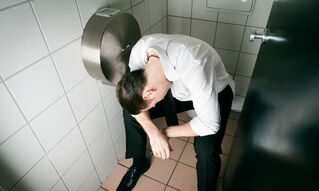Prostatitis is one of the most common urinary diseases in which an inflammatory process develops, covering the tissues of the prostate gland. Prostatitis can manifest itself in men of any age and is often accompanied by other reproductive system diseases. The causes of prostatitis in men can vary, and to reduce the likelihood of this disease, they need to be considered in more detail.
Category

Regarding the development of the pathological process, there are three main forms of prostatitis:
- Sharp.Symptoms come on suddenly and appear as bright as possible. Therefore, most men with acute prostatitis see a doctor during the first days of the opening process. A typical symptom of the disease is severe low back pain, which occurs against an increase in body temperature of 39 degrees. Most often, the cause of prostatitis is a concentrated infection, which can develop in distant organs.
- Chronic.If acute prostatitis is not treated promptly, it will turn into a chronic form. It is characterized by less severe symptoms, and the patient's general condition can be called satisfactory. The temperature dropped to the normal limit.
- Delayed.The inflammatory process is not contagious. It is caused by stagnant processes that are observed in the pelvic organs. The disease is characterized by progressive progression with progressive disease symptoms. Today, this form of the disease is extremely rare.
The chronic form of the disease is considered very dangerous, as most men neglect mild symptoms, delaying seeing a specialist. With this approach, the development of many complications of the disease is possible.
The disease is increasingly "rejuvenated" over time, so it can be seen at all ages.
What Causes Prostatitis?
This disease develops in one third of men 20-60 years old. So, unlike some diseases of the genitourinary system, this disease cannot be called age-related. There are several causes of prostatitis in men, the main one which will be discussed below.
Acute and chronic infections
Infectious lesions are the primary cause of prostatitis. When the infection enters the prostate gland, an inflammatory process develops. Usually, diseases such as gonorrhea and urethritis are responsible for these forms of prostatitis.
Pathological processes such as tooth decay, tonsillitis, tuberculosis, etc. v. May provoke the development of infectious prostatitis.
To cure this form of the disease, it is necessary to remove the infectious agent that has become the main cause of its development. Only after inactivating the main infectious agent can prostatitis be completely cured.
Congestion

Every man should have enough sex in his lifetime - otherwise he won't get rid of problems with his prostate.
The consequence of a lack of regular sex life can be the development of an obstruction of the prostate gland. At the same time, blood circulation in the organ is disturbed, so the bile is stagnant, disrupting the activity of this organ. All of this can lead to deformation of the prostate gland and the development of the inflammatory process.
Regular sexual activity will help you avoid a buildup of prostate secretions. Furthermore, experts recommend that their patients refrain from promiscuous relationships by finding a long-term sexual partner.
Sedentary work
In recent decades, there has been a rapid transition from manual to intellectual labor. And it is the sedentary lifestyle that is one of the main causes of prostatitis in men.
In addition, sedentary lifestyles lead to impaired nervous, endocrine and cardiovascular functions. As a result, the cells of the prostate gland receive less oxygen, which leads to the creation of optimal conditions for the reproduction of pathogenic microflora.
And while sedentary work is not the direct cause of prostatitis, it does provide optimal conditions for prostate infection. Therefore, to prevent prostatitis, the body should provide regular physical activity.
When implementing an active lifestyle, a person's blood flow normalizes, the endocrine and nervous systems work better. Hence, the prostate tissue is protected from oxygen starvation.
Prolong abstinence
When there is no regular sexual activity, the secretion will be delayed in the organ. As a result, blood circulation in the prostate's tissues becomes difficult. The result is the same as leading a passive lifestyle.
Oxygen starvation leads to the fact that in the tissues of the prostate there are ideal conditions for the reproduction of pathogenic microorganisms. Therefore, just weak infection of the body is enough for the development of prostatitis to be guaranteed.
Hypothermia

Freezing is a surefire way of appearing pathological.
Scientists believe that hypothermia is one of the main causes of the development of prostatitis. Prostatitis due to hypothermia develops for a number of reasons:
- Due to hypothermia, vasoconstriction occurs, leading to impaired tissue nutrition and impaired function of the organs.
- When the body is significantly frozen, a person's immune system is weakened. This leads to the fact that the body becomes susceptible to various types of infectious damage.
Hypothermia becomes especially dangerous for men who have previously had prostatitis. Even after the disease is cured, the disease can still come back.
To avoid the development of prostatitis, it is necessary to wear warm during the cold season, avoid sitting on a cold and cold surface. Also forbidden to walk barefoot on the floor is not warm enough.
Other reasons
The development of prostatitis can occur not only due to the above reasons but also due to the influence of factors such as:
- are obese;
- poor working conditions, where there is a strong load on the perineum or significant vibration;
- hormonal disorders;
- ARVI is transferred on the leg;
- Chronic constipation.
The best prevention for this disease is to avoid the above factors. Men who have ever had prostatitis are especially susceptible to it.
Who is at risk
Anyone who has had a problem with the prostate in the past can face this disease again.
After looking at the cause of prostatitis, you should identify a group of people that are prone to its appearance. The following men are susceptible to prostatitis:

- leads a sedentary lifestyle;
- suffer from frequent constipation;
- obesity;
- does sedentary work;
- suffered severe stress and hard labor;
- having sex sporadically or changing sexual partners frequently;
- previously had prostatitis;
- has an immune disorder;
- people who abuse alcohol and tobacco.
Characteristics of development in youth and old age
Prostatitis can develop in young people due to a number of factors. The main reasons are: sedentary, lack of adequate intimate life, sedentary lifestyle. In order to minimize the development of the disease, you need to exclude these factors from your life.
In the elderly, the disease usually develops in the context of impaired sexual function. As the body ages, the reproductive system undergoes changes, resulting in it sooner or later ceasing to function. A significant decrease in fertility is observed in men aged 45-50 years.
Also, this can happen under the influence of hormonal changes in the body, as a result of which the volume of testosterone production decreases. And it is these changes that are one of the main causes of prostatitis.
Reasons for the transition from acute to chronic
While acute prostatitis has vivid symptoms, forcing the patient to see a specialist, the chronic form often has no characteristic symptoms. In most cases, men are in no hurry to see a doctor if they notice some discomfort. As a result, the disease develops into more severe forms.
But how does the disease become chronic? Most often, the cause of the development of the chronic process is the inadequately treated acute form. In this case, the transition from one form to another happens under the influence of the following factors:
- Treatment started late.
- Ineffective therapy or wrong technique was chosen.
- The patient's immune response has been significantly reduced.
- There is no cure for acute prostatitis.
It should be understood that asymptomatic chronic process of inflammatory process sooner or later ends with an exacerbation. After that, the patient has all signs of the disease, including severe pain in the perineum and lower back, difficulty urinating, and impaired sexual function.
Chronic prostatitis has one important feature: when the prostate gland becomes primarily inflamed, there is a decrease in its ability to function. This in turn has an extremely negative effect on his work, often inducing autoimmune processes. In this case, the immune system begins to produce antibodies against the prostate tissue. Therefore, even if the primary infection is eliminated, it will be impossible to avoid the progression of such prostatitis.
Symptoms

The main symptom of the development of prostatitis is pain. It turns out that an inflammatory process develops in the prostate gland. In this case, the discomfort can be of a different nature and intensity. Urination causes severe pain.
This disease is particularly nasty, and is in an acute phase of development. Against the background of intense pain, patients suffer from sleep disturbances, the performance is significantly reduced, like the overall quality of life.
Prostatitis pain has the following characteristics:
- is localized in the perineum, lower abdomen, lower back;
- radiates to the genital area;
- increased discomfort during defecation, during stimulation and during ejaculation;
- accompanied by sexual dysfunction.
Erection problems are a symptom that is characteristic of a chronic form of the disease. Since such functional disorders may have different degrees of manifestation, their therapies have some differences.
It is not uncommon for men with an erection to develop prostatitis. Most patients are unable to complete intercourse or ejaculate prematurely. Such disorders negatively affect the composition of the spermatozoa.
Methods of treatment
Specific type of therapy is determined by the specialist based on the features of the course of the disease. In this case, the reason why this disease develops should be taken into account. Therefore, the main method of treating the acute form of the disease is antibiotic therapy. These drugs are taken even when the disease is not caused by bacteria.
Complex treatment is provided for chronic prostatitis. It includes the following procedure:
- drug therapy;
- physiotherapy;
- take immunomodulatory drugs;
- massage the prostate gland.
If chronic prostatitis is of a non-bacterial nature, then its treatment is carried out using nonsteroidal drugs. Barbiturates are used as an additional treatment.
Prevention of prostatitis is an active lifestyle, having regular sex with partners and prompt treatment of infectious diseases.


























